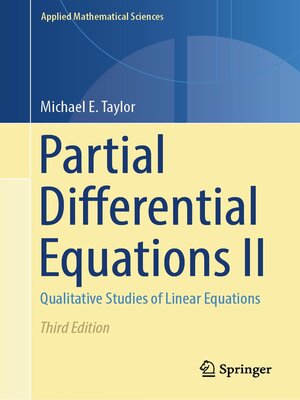Partial Differential Equations II
ebook ∣ Qualitative Studies of Linear Equations · Applied Mathematical Sciences
By Michael E. Taylor

Sign up to save your library
With an OverDrive account, you can save your favorite libraries for at-a-glance information about availability. Find out more about OverDrive accounts.
Find this title in Libby, the library reading app by OverDrive.



Search for a digital library with this title
Title found at these libraries:
| Library Name | Distance |
|---|---|
| Loading... |
This second in the series of three volumes builds upon the basic theory of linear PDE given in volume 1, and pursues more advanced topics. Analytical tools introduced here include pseudodifferential operators, the functional analysis of self-adjoint operators, and Wiener measure. The book also develops basic differential geometrical concepts, centered about curvature. Topics covered include spectral theory of elliptic differential operators, the theory of scattering of waves by obstacles, index theory for Dirac operators, and Brownian motion and diffusion. The book is targeted at graduate students in mathematics and at professional mathematicians with an interest in partial differential equations, mathematical physics, differential geometry, harmonic analysis, and complex analysis.
The third edition further expands the material by incorporating new theorems and applications throughout the book, and by deepening connections and relating concepts across chapters. It includes new sections on rigid body motion, on probabilistic results related to random walks, on aspects of operator theory related to quantum mechanics, on overdetermined systems, and on the Euler equation for incompressible fluids. The appendices have also been updated with additional results, ranging from weak convergence of measures to the curvature of Kahler manifolds.
The third edition further expands the material by incorporating new theorems and applications throughout the book, and by deepening connections and relating concepts across chapters. It includes new sections on rigid body motion, on probabilistic results related to random walks, on aspects of operator theory related to quantum mechanics, on overdetermined systems, and on the Euler equation for incompressible fluids. The appendices have also been updated with additional results, ranging from weak convergence of measures to the curvature of Kahler manifolds.
Michael E. Taylor is a Professor of Mathematics at the University of North Carolina, Chapel Hill, NC.
Review of first edition: "These volumes will be read by several generations of readers eager to learn the modern theory of partial differential equations of mathematical physics and the analysis in which this theory is rooted."
(Peter Lax, SIAM review, June 1998)







